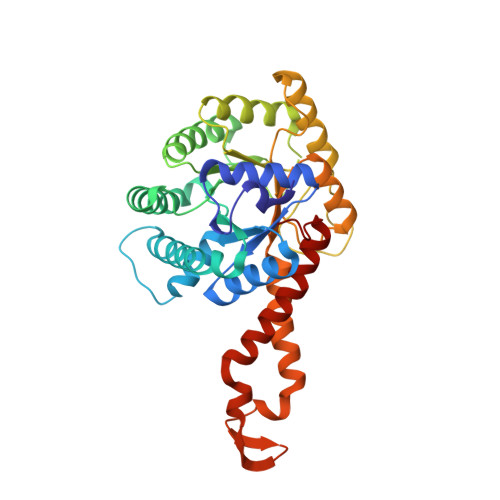Active site remodeling during the catalytic cycle in metal-dependent fructose-1,6-bisphosphate aldolases.
Jacques, B., Coincon, M., Sygusch, J.(2018) J Biol Chem 293: 7737-7753
- PubMed: 29593097
- DOI: https://doi.org/10.1074/jbc.RA117.001098
- Primary Citation of Related Structures:
5UCK, 5UCN, 5UCP, 5UCS, 5UCZ, 5UD0, 5UD1, 5UD2, 5UD3, 5UD4, 5VJD, 5VJE, 5VJF - PubMed Abstract:
Crystal structures of two bacterial metal (Zn 2+ )-dependent d-fructose-1,6-bisphosphate (FBP) aldolases in complex with substrate, analogues, and triose-P reaction products were determined to 1.5-2.0 Å resolution. The ligand complexes cryotrapped in native or mutant Helicobacter pylori aldolase crystals enabled a novel mechanistic description of FBP C3-C4 bond cleavage. The reaction mechanism uses active site remodeling during the catalytic cycle, implicating relocation of the Zn 2+ cofactor that is mediated by conformational changes of active site loops. Substrate binding initiates conformational changes triggered upon P1 phosphate binding, which liberates the Zn 2+ -chelating His-180, allowing it to act as a general base for the proton abstraction at the FBP C4 hydroxyl group. A second zinc-chelating His-83 hydrogen bonds the substrate C4 hydroxyl group and assists cleavage by stabilizing the developing negative charge during proton abstraction. Cleavage is concerted with relocation of the metal cofactor from an interior to a surface-exposed site, thereby stabilizing the nascent enediolate form. Conserved residue Glu-142 is essential for protonation of the enediolate form prior to product release. A d-tagatose 1,6-bisphosphate enzymatic complex reveals how His-180-mediated proton abstraction controls stereospecificity of the cleavage reaction. Recognition and discrimination of the reaction products, dihydroxyacetone-P and d-glyceraldehyde 3-P, occurs via charged hydrogen bonds between hydroxyl groups of the triose-Ps and conserved residues, Asp-82 and Asp-255, respectively, and are crucial aspects of the enzyme's role in gluconeogenesis. Conformational changes in mobile loops β5-α7 and β6-α8 (containing catalytic residues Glu-142 and His-180, respectively) drive active site remodeling, enabling the relocation of the metal cofactor.
Organizational Affiliation:
From the Department of Biochemistry and Molecular Medicine, Université de Montréal, Montréal, Québec H3C 3J7, Canada.

















